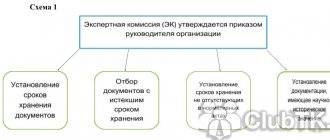The storage period for documents in the organization is 2020-2021.
According to Art. Law “On Archival Affairs” No. 125-FZ of October 22, 2004, the safety of archival documents must be ensured within the time limits established by laws and other regulations, as well as lists of standard documents approved by Rosarkhiv and various federal departments.
Order of the Federal Archive No. 236 dated December 20, 2019 introduced new retention periods for most management, personnel, accounting, tax and other documents from February 18, 2020. The previously valid Order of the Ministry of Culture No. 558 dated August 25, 2010 has lost force and is no longer applicable. Also, some storage periods for documentation are established by the Tax Code of the Russian Federation, the Accounting Law No. 402 of December 6, 2011, and other regulatory documents.
The new periods for storing documents in the archive apply regardless of the legal form of the company, and they also apply to individual entrepreneurs. Subjects can ensure the safety of documentation on their own, or with the help of a specialized archival organization, which is especially important for large volumes of documents.
We present the current storage periods for a number of basic documents generated in the course of enterprise activities.
Note
A 50/75 year retention period means that documents completed before January 1, 2003 are retained for 75 years; completed office work after January 1, 2003, are stored for 50 years.
Documents generated in the process of activities of sources of acquisition of state and municipal archives with archival documents are subject to examination of value after the expiration of established storage periods.
Documents on personnel generated in connection with the passage by citizens of public service, which is not the state civil service, are stored in the state bodies in which citizens served in the public service, which is not the state civil service, for 75 years after the termination of public service with an examination of the value documents after the expiration of the specified storage period (Article 22.1 of Federal Law No. 125-FZ of October 22, 2004 “On Archiving in the Russian Federation”).
Storage periods for accounting documents - table
Failure to comply with the storage deadlines for accounting and primary documents can result in significant fines for the company, since a document destroyed before the deadline cannot be provided to inspectors in the event of a tax audit.
We present the storage periods for primary documents in the table along with the periods for accounting documentation.
New storage periods for accounting documents. Table 1
| Document | Storage period for accounting documents in an organization | Base |
| Accounting policies and other documents on the organization and maintenance of accounting | Minimum 5 years after the year in which they were last used for accounting purposes | Law No. 402 of December 6, 2011, Part 2 of Art. 29 |
| Accounting registers (general ledger, journals/orders, turnover sheets, registers, cards, transaction journals, etc.) | 5 years (subject to an audit), but not less than 5 years after the reporting year | Law No. 402 of December 6, 2011, Part 1 of Art. 29; List of Rosarkhiv, approved. By Order No. 236 of December 20, 2019, Art. 276 |
| Accounting (balance sheets, financial statements, reports on intended use, appendices to them) and audit reports on it | Annual - constantly Intermediate – 5 years (permanently – in the absence of annual reporting) | List of Rosarkhiv, approved. By Order No. 236 of December 20, 2019, Art. 268, 286 |
| “Primary” and related supporting documents (cash, bank documents, acceptance certificates and write-offs of property, materials, advance reports, invoices, correspondence) | 5 years (subject to an audit), but not less than 5 years after the reporting year | Law No. 402 of December 6, 2011, Part 1 of Art. 29; List of Rosarkhiv, approved. By Order No. 236 of December 20, 2019, Art. 277 |
| Waybills | 5 years In the absence of other documents confirming harmful and dangerous working conditions: 50/75 years (75 years - completed with office work before 01/01/2003; 50 years - after 01/01/2003) | List of Rosarkhiv, approved. By Order No. 236 of December 20, 2019, Art. 553 |
| Documents confirming receipt of salary, financial assistance, fees, benefits, etc. (pay slips, payslips) | 6 years In the absence of personal accounts – 50/75 years | List of Rosarkhiv, approved. By Order No. 236 of December 20, 2019, Art. 295, 298 |
| Documents on the payment of benefits, sick leave, financial assistance (applications, lists of employees, conclusions, extracts from protocols, correspondence) | 5 years | |
| Documents on inventory of assets and liabilities | 5 years subject to audit | List of Rosarkhiv, approved. By Order No. 236 of December 20, 2019, Art. 321, 322 |
| Inventory lists of liquidation commissions | Constantly | |
| Documents on revaluation, determination of depreciation, write-off of fixed assets and intangible assets | 5 years after disposal of fixed assets and intangible assets | List of Rosarkhiv, approved. By Order No. 236 of December 20, 2019, Art. 323 |
| GPC agreements with individuals, acceptance certificates for works and services | 50/75 years | List of Rosarkhiv, approved. By Order No. 236 of December 20, 2019, Art. 12, 29, 301 |
| Documents for agreements, agreements, contracts | 5 years | |
| Foundation agreements of the organization | Constantly | |
| Documents on currency transactions carried out in the Russian Federation | Minimum 3 years from the date of the relevant currency transaction, but not earlier than the date of execution of the agreement | Law No. 173-FZ of December 10, 2003, clause 2, part 2, art. 24 |
Tax accounting and reporting: document retention period
The table below reflects the deadlines that apply to taxpayers and tax agents, as well as to payers of insurance premiums.
Reference table with new storage periods for tax accounting documents. table 2
| Document | Shelf life | Base |
| Documents required for the calculation and payment of taxes, incl. confirming the amounts of income/expenses and payment of taxes by taxpayers and tax agents | Minimum 4 years | Tax Code of the Russian Federation, paragraphs. 8 clause 1 art. 23, pp. 5 paragraph 3 art. 24 |
| Tax returns, calculations for all taxes | 5 years IP declarations earlier than 2003 – 75 years | List of Rosarkhiv, approved. By Order No. 236 of December 20, 2019, Art. 310 |
| Invoices | 5 years | List of Rosarkhiv, approved. By Order No. 236 of December 20, 2019, Art. 317 |
| Logs of received/issued invoices (paper and electronic) | Minimum 4 years from last entry date | Government Decree No. 1137 of December 26, 2011, Appendix No. 3, clause 13 |
| Purchase/sale books (paper and electronic) | Minimum 4 years from last entry date | Government Decree No. 1137 of December 26, 2011, Appendix No. 4, paragraph; Appendix No. 5, paragraph 22 |
| Documents on personal income tax (calculations, messages about the impossibility of withholding, tax registers), certificates of income and tax amounts for individuals | 5 years 50/75 years – in the absence of personal accounts or salary statements | List of Rosarkhiv, approved. By Order No. 236 of December 20, 2019, Art. 311,312 |
| Documents confirming expenses for employee training, for the employee to undergo an independent qualification assessment (for income tax) | During the validity period of the relevant contract and 1 year of the employee’s work, but not less than 4 years | Tax Code of the Russian Federation, clause 3, art. 264, paragraph 4 of Art. 283 |
| Documents confirming the amount of loss incurred (for income tax) | During the entire period of reduction of the tax base of the current period by the amounts of previously received losses | |
| Documents confirming the amount of the loss incurred and the amount by which the tax base was reduced for each tax period (according to the simplified tax system, unified agricultural tax) | During the entire period of use of the right to reduce the tax base by the amount of the loss | Tax Code of the Russian Federation, clause 7, art. 346.18, paragraph 5 of Art. 346.6 |
| Documents required for calculation and payment of insurance premiums | 6 years | Tax Code of the Russian Federation, clause 3.4 art. 23 |
| Calculations for insurance premiums | 50/75 years | List of Rosarkhiv, approved. By Order No. 236 of December 20, 2019, Art. 308, 309 |
| Cards for individual accounting of amounts of payments and accruals of insurance premiums | 6 years 50/75 years – in the absence of personal accounts or payroll records | |
| 4-FSS calculations accepted by the FSS of the Russian Federation in electronic form, incl. receipts | Minimum 5 years from the date of acceptance of the calculation by the Fund | Order of the FSS of the Russian Federation dated February 12, 2010 No. 19, clause 6.2, 6.3 |
Drivers are asked to hurry up
According to the law, the post office must notify about the “chain letter” so that the person can then receive it himself at the post office. The fact is that the deadline for paying the fine begins to count from the moment such a letter is received, and if it was simply thrown into the mailbox, then it is not a fact that the car owner will receive it. He has 10 days to appeal the fine from the moment he received the letter and 60 days to pay if he does not intend to appeal it. After 70 days, administrative measures can already be applied to the defaulter. If the car owner did not receive the “letter of happiness” and it was returned back to the traffic police, then the period is counted from the moment the letter is returned.
The Samara Provincial Duma initiated the reduction of the storage period for “chain letters”: for some offenses, car owners are held accountable not by traffic police departments, but by certain administrative commissions; by law, they have only 15 days to consider the case, and if this requires a summons to the car owner , they do not always manage to meet the deadline for 30-day storage of letters at the post office.
Until now, only court letters were kept at the post office for seven days. Why do you think most appeals against court decisions begin with requests to restore time? Precisely because a person who did not know that a lawsuit was being prepared against him did not look into his mailbox every day, simply did not receive a letter from the court. He discovers the notification, arrives at the post office, but the letter addressed to him has already been sent back. The same will now happen with fines. The seven-day shelf life does not take into account that a person may be on a business trip, in a hospital, or on vacation. The number of requests to restore deadlines will only increase.
Yes, with a 30-day storage period, cunning motorists diligently delayed the deadline: they received the letter on the last day, then exactly on the tenth day they sent an appeal to the traffic police, indicating that they were not the ones driving.
As a result, when the letter was received by the inspector, the time allotted for the administrative investigation - which was two months - had expired, and it was no longer possible to hold anyone accountable for the violation. But only a few unscrupulous drivers took advantage of this. Those who have just sold a car will have to check their mailbox especially carefully: the new owner has 10 days to register the car, until then all fines will be sent to the old owner by mail, it is important to appeal them in time.
There is only one way out for car owners - to sign up for the delivery of fines electronically. There are several ways, but only one assumes that a fine in electronic form will be legally equivalent to a paper letter. To do this, you need to create an email account at Russian Post, for example, in its mobile application. This can be done directly at the post office, or through the government services portal if you have completed full personal identification there. In this case, paper letters will no longer arrive. A legally significant document about a fine received through the mail system can be printed and an appeal can be launched.
You will not be able to appeal a fine notification received through the public services portal or the traffic police portal. This is not a document, and therefore a paper letter will be sent along with the electronic notification. You can, of course, when you see a message about a fine, go to the traffic police yourself and get a copy of the resolution in your hands, but it’s still more convenient by mail, especially if it was issued in another city.
Recently, the State Duma adopted in the first reading an amendment to the Code of Administrative Offenses, thanks to which a car owner who received a “letter of happiness” late can petition to restore the deadline for paying half of the fine. He has this opportunity within 20 days from the date of the decision. When the post office starts holding penalty letters for just seven days, the number of petitions will increase dramatically. There will also be a huge number of complaints that a copy of the resolution did not reach the car owner. Although she came, she returned back.
To appeal a fine, you can use a document sent through the Russian Post application.
We also recall that the Ministry of Internal Affairs discussed a proposal not to send “chain letters” to those who paid the fine with a discount within 20 days after the decision was made. And send decisions only to those who did not do this. This proposal would suit everyone. The traffic police and local authorities would save on letters. After all, 78 percent of all fines paid are paid at a discount.
There is only one way out for car owners - to sign up for the delivery of fines electronically. Photo: Sergey Mikheev
By the way
It will be more difficult for drivers whose licenses have been revoked to get them back. They will be required to pay in full any fines imposed on them. On Saturday, a government decree came into force, which approved amendments to the Rules for the return of a driver's license.
Let us remind you that until now, if a driver’s license was taken away, in order to return it back after the expiration of the period of deprivation, it was necessary to pass a test on knowledge of traffic rules. The most problematic situation was with drunk drivers and those who refused to undergo a medical examination. In addition to deprivation of rights, a fine of 30 thousand rubles was also imposed on them. But the driver, after walking for a year and a half, received his license back, regardless of whether he paid the fine or not.
But for many drivers, it is a large fine that should be a stopping factor from driving while intoxicated. Thirty thousand rubles is a lot of money for many people. But the deterrent did not work. The Ministry of Justice even developed a bill according to which, when a driver was caught drunk, it was proposed to return the car only on bail in the amount of this fine. However, this project never went through.
But new requirements for the return of licenses will now oblige drivers to pay off all debts before returning the driver's license.
Prepared by Vladimir Barshev
Personnel: document storage periods 2021 - table
Maintaining personnel records is mandatory for all employers, including individual entrepreneurs. Only micro-enterprises have the right to refuse to draw up some local acts, provided that the issues regulated by them will be included in employment contracts with employees (Article 309.2 of the Labor Code of the Russian Federation). But otherwise, the personnel document flow is the same for everyone.
For most HR documents in 2020-2021. Very long storage periods are established, and the employer must often provide appropriate conditions for their safety, because they contain personal data of employees.
Storage periods for personnel documents. Table 3
| Document | Shelf life | Base |
| Documents on personnel, except for those for which a different storage period is established | 50/75 years | Law “On Archival Affairs” No. 125-FZ of October 22, 2004, Art. 22.1 |
| Personal files, personal cards of managers and employees | 50/75 years | List of Rosarkhiv, approved. By Order No. 236 of December 20, 2019, Art. 435, 444, 445 |
| Employment contracts, service contracts, additional agreements to them | 50/75 years | |
| Orders and documents related to the application of disciplinary sanctions | 3 years | List of Rosarkhiv, approved. By Order No. 236 of December 20, 2019, Art. 454 |
| Documents on the processing of personal data | Constantly | List of Rosarkhiv, approved. By Order No. 236 of December 20, 2019, Art. 440, 441 |
| Consent to the processing of personal data | 3 years after expiration of the consent or its revocation (the contract may provide otherwise) | |
| Personal documents in the original (work books, diplomas, certificates, certificates) | On demand by employees Unclaimed documents are stored for 50/75 years | List of Rosarkhiv, approved. By Order No. 236 of December 20, 2019, Art. 449 |
| Information about work activity and work experience | 50/75 years | List of Rosarkhiv, approved. By Order No. 236 of December 20, 2019, Art. 450 |
| Staffing table | Constantly | List of Rosarkhiv, approved. By Order No. 236 of December 20, 2019, Art. 40 |
| Time sheets (schedules), working time logs | 5 years 50/75 years – under harmful and dangerous working conditions | List of Rosarkhiv, approved. By Order No. 236 of December 20, 2019, Art. 402 |
| Vacation schedules | 3 years | List of Rosarkhiv, approved. By Order No. 236 of December 20, 2019, Art. 453 |
| Trip reports | 5 years | List of Rosarkhiv, approved. By Order No. 236 of December 20, 2019, Art. 452 |
| Sick leave certificates and their registration logs | 5 years | List of Rosarkhiv, approved. By Order No. 236 of December 20, 2019, Art. 618, 619 |
| Orders, instructions and documents thereto | By core activity - constantly On administrative and economic issues – 5 years | List of Rosarkhiv, approved. By Order No. 236 of December 20, 2019, Art. 19 |
| Orders, instructions for personnel and documents for them | 50/75 years - on admission, transfer, combination, part-time, dismissal, remuneration, advanced training, leave - to care for children, without pay 5 years - on annual and educational leaves, business trips (in the presence of harmful, dangerous working conditions - 50/75 years), on service inspections | List of Rosarkhiv, approved. By Order No. 236 of December 20, 2019, Art. 434 |
| Job descriptions (regulations) | Typical – 3 years after replacement with new ones Workers' instructions – 50/75 years | List of Rosarkhiv, approved. By Order No. 236 of December 20, 2019, Art. 442, 443 |
| Reports on industrial accidents (with investigation materials), accident logs | 45 years | Labor Code of the Russian Federation, art. 230, 230.1 |
| Internal labor regulations | 1 year after replacement with new ones | List of Rosarkhiv, approved. By Order No. 236 of December 20, 2019, Art. 381 |
| Collective agreements | Constantly | List of Rosarkhiv, approved. By Order No. 236 of December 20, 2019, Art. 386 |
New fines for violating documentation storage rules
From October 26, 2021, amendments to Art. 13.20 Code of Administrative Offenses of the Russian Federation. Law No. 341-FZ of October 15, 2020 significantly tightened the punishment for violating the rules of storage, as well as recording, compiling and using archival documents. Now, violators of the document retention period in 2021, the tables of which are given above, face the following fines:
- for citizens 1 – 3 thousand rubles. (or warning);
- for officials – 3 – 5 thousand rubles;
- for an organization – 5 – 10 thousand rubles.
Let us recall that before amendments were made to the Code of Administrative Offenses of the Russian Federation, fines ranged from 100 to 300 rubles. for citizens and 300 - 500 rubles. for officials and for legal entities no sanction was provided at all.
What kind of correspondence is sent out marked “Administrative”
The concept of “rank” implies ranking of mail items, depending on which recipients it is intended for or which group of senders it comes from.
"Administrative" mailings are considered 1st class mail and must be delivered promptly. Usually they are called registered or valuable letters.
By marking “Administrative” the Ministry of Telecom and Mass Communications summarizes the list of specific documents of an informative or notification nature, which are equated to judicial correspondence. In addition, invitations on behalf of a certain official to visit a government agency or city administration have this mark.
As a rule, a postal item marked “Administrative” contains the following documents:
- Notification of penalties for traffic violations.
- Tax notice of payment (transport tax, real estate tax, etc.).
- A summons to appear in court as a witness or defendant.
- Copies of acts, rulings, resolutions, court decisions.
- An invitation from a civil servant or official.
Only the person indicated as the recipient has the right to pick up an “administrative” message from the post office. The recipient must appear at the post office within a limited period of time, with a passport and a notification form for a registered letter. Relatives or other persons, even if the recipient's original passport is provided, will be refused delivery by postal employees. The only exception can be a notarized power of attorney, which allows you to represent the interests of the person indicated in the postal item.






